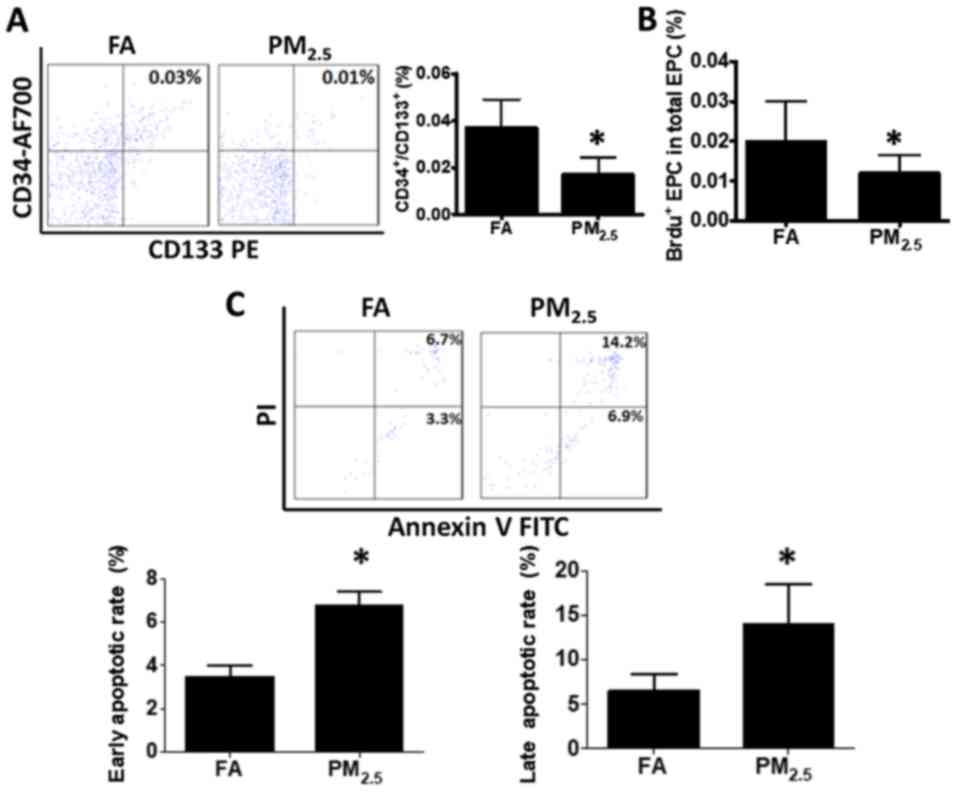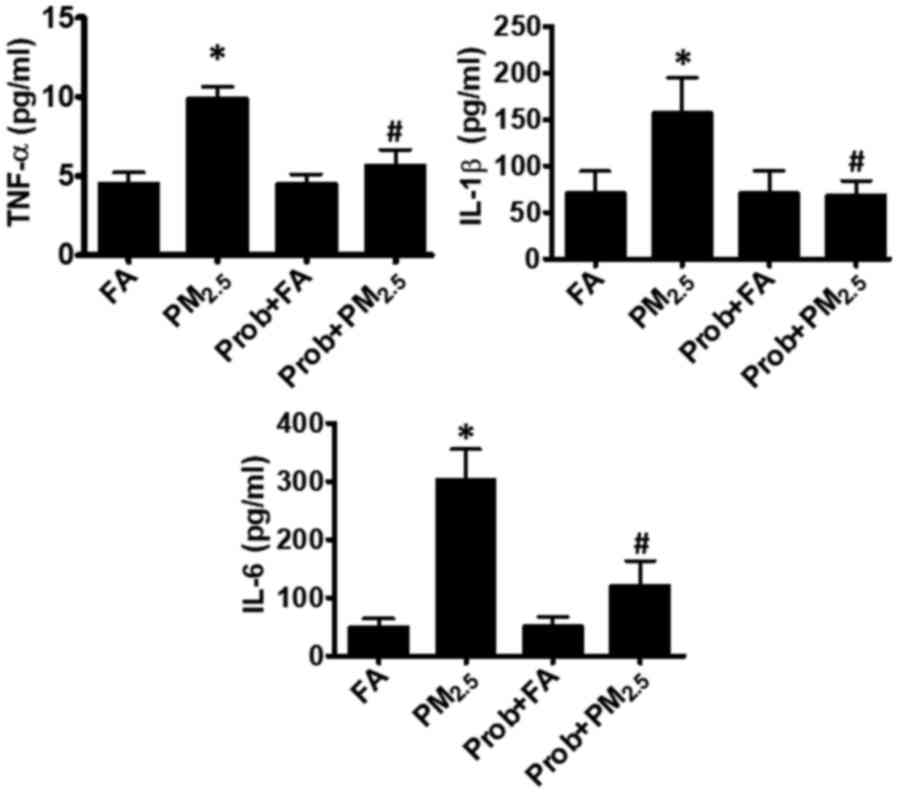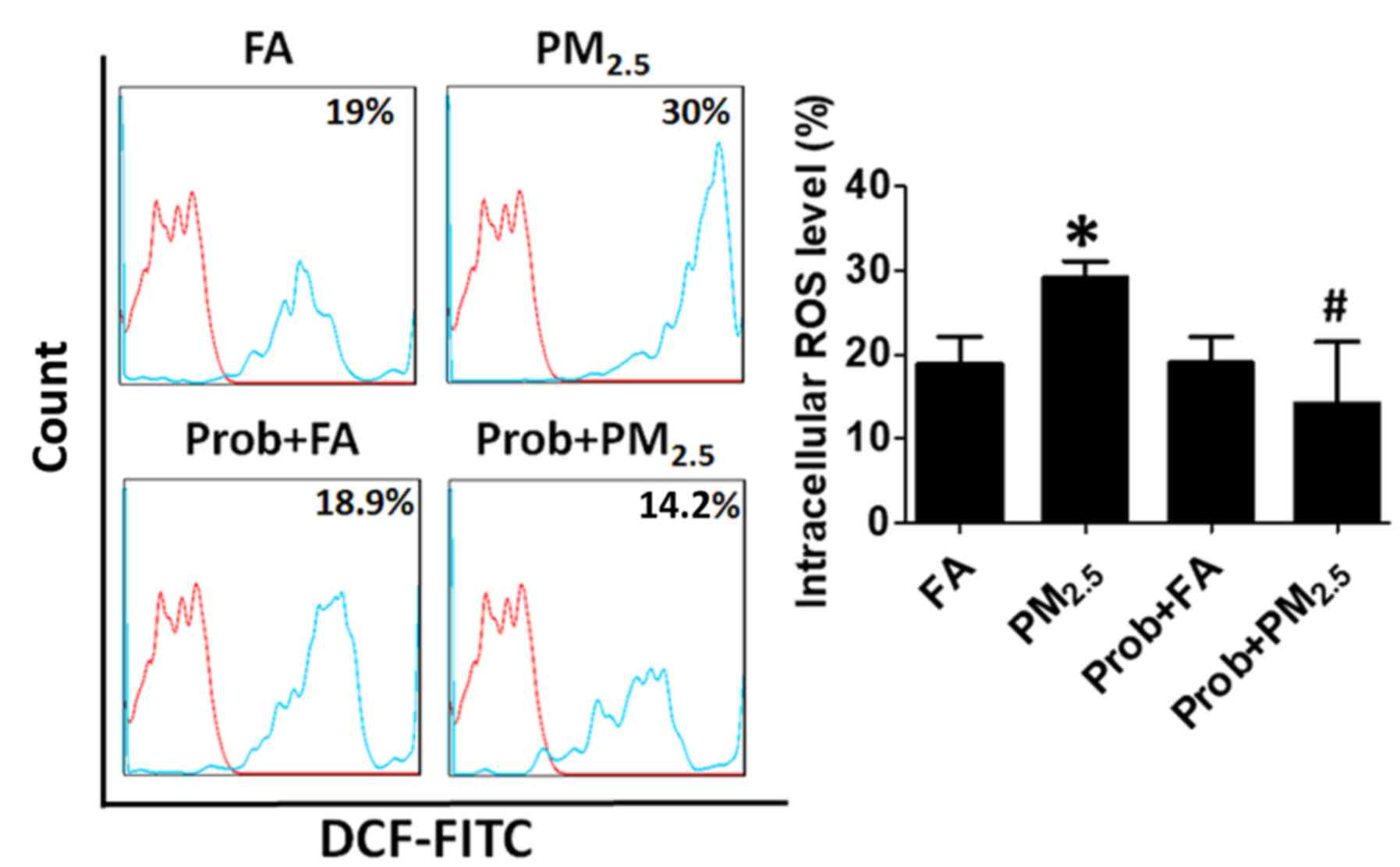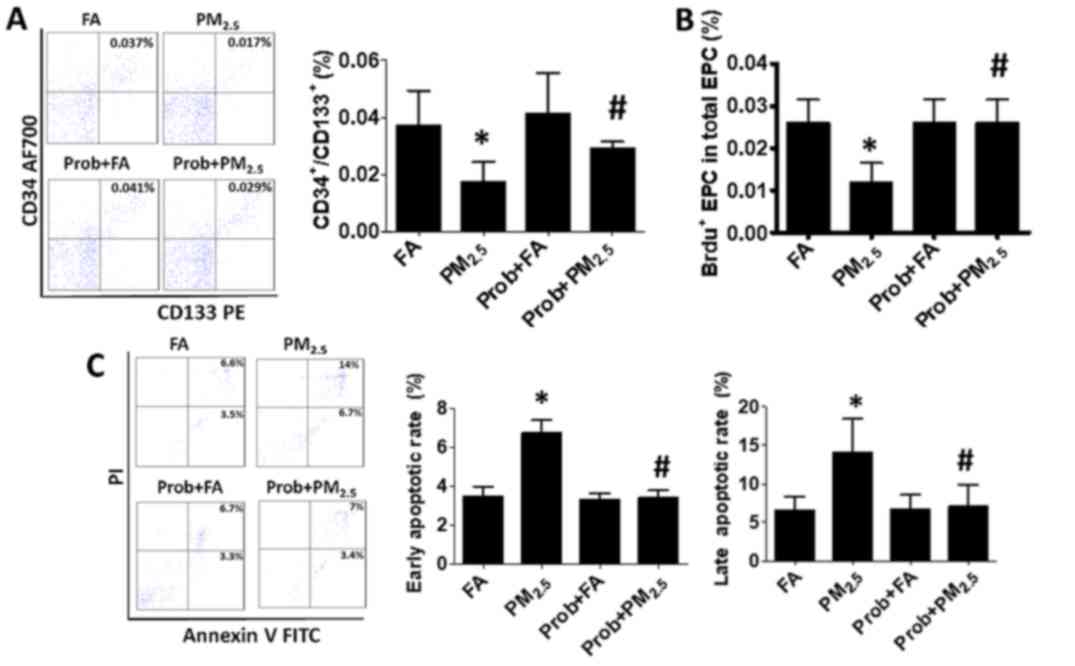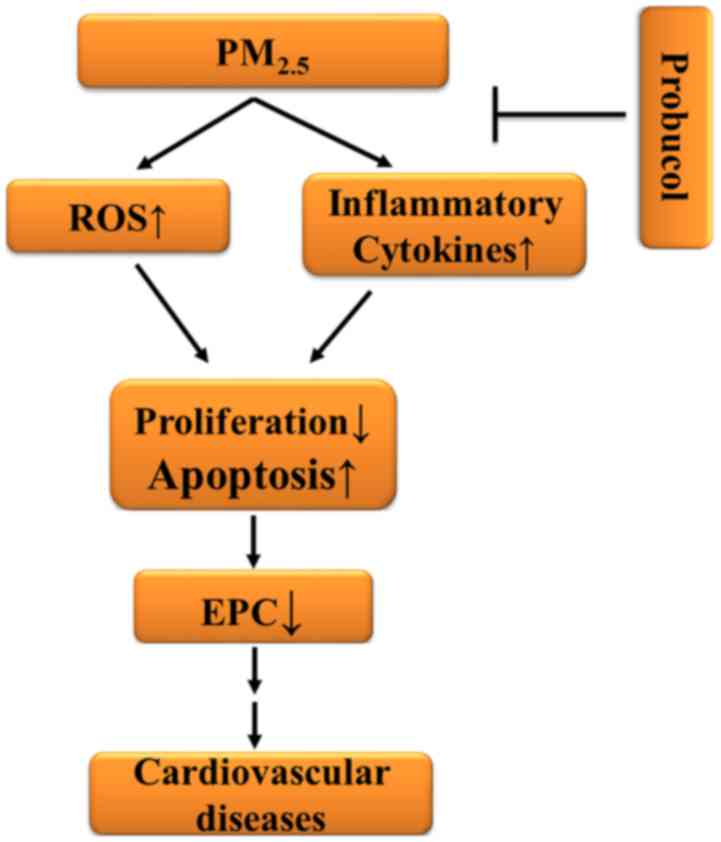|
1
|
Natarelli L and Schober A: MicroRNAs and
the response to injury in atherosclerosis. Hamostaseologie.
35:142–150. 2015. View Article : Google Scholar : PubMed/NCBI
|
|
2
|
Laurenzana A, Fibbi G, Margheri F,
Biagioni A, Luciani C, Del Rosso M and Chillà A: Endothelial
progenitor cells in sprouting angiogenesis: Proteases pave the way.
Curr Mol Med. 15:606–620. 2015. View Article : Google Scholar : PubMed/NCBI
|
|
3
|
Crouse DL, Peters PA, Hystad P, Brook JR,
van Donkelaar A, Martin RV, Villeneuve PJ, Jerrett M, Goldberg MS,
Pope CA III, et al: Ambient PM2.5, O3 and NO2
Exposures and associations with mortality over 16 years of
follow-up in the Canadian census health and environment cohort
(CanCHEC). Environ Health Perspect. 123:1180–1186. 2015. View Article : Google Scholar : PubMed/NCBI
|
|
4
|
Robertson S and Miller MR: Ambient air
pollution and thrombosis. Part Fibre Toxicol. 15:12018. View Article : Google Scholar : PubMed/NCBI
|
|
5
|
Cui Y, Sun Q and Liu Z: Ambient
particulate matter exposure and cardiovascular diseases: A focus on
progenitor and stem cells. J Cell Mol Med. 20:782–793. 2016.
View Article : Google Scholar : PubMed/NCBI
|
|
6
|
Liberda EN, Cuevas AK, Gillespie PA,
Grunig G, Qu Q and Chen LC: Exposure to inhaled nickel
nanoparticles causes a reduction in number and function of bone
marrow endothelial progenitor cells. Inhal Toxicol. 22 Suppl
2:S95–S99. 2010. View Article : Google Scholar
|
|
7
|
Brook RD, Bard RL, Kaplan MJ, Yalavarthi
S, Morishita M, Dvonch JT, Wang L, Yang HY, Spino C, Mukherjee B,
et al: The effect of acute exposure to coarse particulate matter
air pollution in a rural location on circulating endothelial
progenitor cells: Results from a randomized controlled study. Inhal
Toxicol. 25:587–592. 2013. View Article : Google Scholar : PubMed/NCBI
|
|
8
|
Cui Y, Xie X, Jia F, He J, Li Z, Fu M, Hao
H, Liu Y, Liu JZ, Cowan PJ, et al: Ambient fine particulate matter
induces apoptosis of endothelial progenitor cells through reactive
oxygen species formation. Cell Physiol Biochem. 35:353–363. 2015.
View Article : Google Scholar : PubMed/NCBI
|
|
9
|
Zhang M, Hou Y, Shen Y, Guo X, Shang D and
Zhang D: Probucol reverses homocysteine induced inflammatory
monocytes differentiation and oxidative stress. Eur J Pharmacol.
818:67–73. 2018. View Article : Google Scholar : PubMed/NCBI
|
|
10
|
Zhang Q, Chen L, Si Z, Bu H, Narasimhulu
CA, Song X, Cui MY, Liu H, Lu T, He G, et al: Probucol protects
endothelial progenitor cells against oxidized low-density
lipoprotein via suppression of reactive oxygen species formation in
vivo. Cell Physiol Biochem. 39:89–101. 2016. View Article : Google Scholar : PubMed/NCBI
|
|
11
|
Turgeon J, Dussault S, Haddad P, Groleau
J, Ménard C, Michaud SE, Maingrette F and Rivard A: Probucol and
antioxidant vitamins rescue ischemia-induced neovascularization in
mice exposed to cigarette smoke: Potential role of endothelial
progenitor cells. Atherosclerosis. 208:342–349. 2010. View Article : Google Scholar : PubMed/NCBI
|
|
12
|
Wu J, He Z, Gao X, Wu F, Ding R, Ren Y,
Jiang Q, Fan M, Liang C and Wu Z: Oxidized high-density lipoprotein
impairs endothelial progenitor cells' function by activation of
CD36-MAPK-TSP-1 pathways. Antioxid Redox Signal. 22:308–324. 2015.
View Article : Google Scholar : PubMed/NCBI
|
|
13
|
Zhang J, Zhou X, Wang Z, Yang L, Wang J
and Wang W: Trace elements in PM2.5 in Shandong
Province: Source identification and health risk assessment. Sci
Total Environ. 621:558–577. 2018. View Article : Google Scholar : PubMed/NCBI
|
|
14
|
Ying Z, Xie X, Bai Y, Chen M, Wang X,
Zhang X, Morishita M, Sun Q and Rajagopalan S: Exposure to
concentrated ambient particulate matter induces reversible increase
of heart weight in spontaneously hypertensive rats. Parti Fibre
Toxicol. 12:152015. View Article : Google Scholar
|
|
15
|
Cui Y, Jia F, He J, Xie X, Li Z, Fu M, Hao
H, Liu Y, Liu DZ, Cowan PJ, et al: Ambient fine particulate matter
suppresses in vivo proliferation of bone marrow stem cells through
reactive oxygen species formation. PLoS One. 10:e01273092015.
View Article : Google Scholar : PubMed/NCBI
|
|
16
|
Calderon-Garciduenas L, Gonzalez-Gonzalez
LO, Kulesza RJ, Fech TM, Pérez-Guillé G, Luna MAJ, Soriano-Rosales
RE, Solorio E, Miramontes-Higuera JJ, Chew Gómez-Maqueo A, et al:
Exposures to fine particulate matter (PM2.5) and ozone
above USA standards are associated with auditory brainstem
dysmorphology and abnormal auditory brainstem evoked potentials in
healthy young dogs. Environ Res. 158:324–332. 2017. View Article : Google Scholar : PubMed/NCBI
|
|
17
|
Zheng Z, Zhang X, Wang J, Dandekar A, Kim
H, Qiu Y, Xu X, Cui Y, Wang A, Chen LC, et al: Exposure to fine
airborne particulate matters induces hepatic fibrosis in murine
models. J Hepatol. 63:1397–1404. 2015. View Article : Google Scholar : PubMed/NCBI
|
|
18
|
Sun Q, Zhang G, Chen R, Li R, Wang H,
Jiang A, Li Z, Kong L, Fonken LK, Rajagopalan S, et al: Central
IKK2 inhibition ameliorates air pollution mediated hepatic glucose
and lipid metabolism dysfunction in mice with type II diabetes.
Toxicol Sci. 164:240–249. 2018. View Article : Google Scholar : PubMed/NCBI
|
|
19
|
An Z, Jin Y, Li J, Li W and Wu W: Impact
of particulate air pollution on cardiovascular health. Curr Allergy
Asthma Rep. 18:152018. View Article : Google Scholar : PubMed/NCBI
|
|
20
|
Pope CA III, Bhatnagar A, McCracken JP,
Abplanalp W, Conklin DJ and O'Toole T: Exposure to fine particulate
air pollution is associated with endothelial injury and systemic
inflammation. Circ Res. 119:1204–1214. 2016. View Article : Google Scholar : PubMed/NCBI
|
|
21
|
O'Toole TE, Hellmann J, Wheat L,
Haberzettl P, Lee J, Conklin DJ, Bhatnagar A and Pope CA III:
Episodic exposure to fine particulate air pollution decreases
circulating levels of endothelial progenitor cells. Circ Res.
107:200–203. 2010. View Article : Google Scholar : PubMed/NCBI
|
|
22
|
Niu J, Liberda EN, Qu S, Guo X, Li X,
Zhang J, Meng J, Yan B, Li N, Zhong M, et al: The role of metal
components in the cardiovascular effects of PM2.5. PLoS One.
8:e837822013. View Article : Google Scholar : PubMed/NCBI
|
|
23
|
Haberzettl P, Lee J, Duggineni D,
McCracken J, Bolanowski D, O'Toole TE, Bhatnagar A and Conklin DJ:
Exposure to ambient air fine particulate matter prevents
VEGF-induced mobilization of endothelial progenitor cells from the
bone marrow. Environ Health Perspect. 120:848–856. 2012. View Article : Google Scholar : PubMed/NCBI
|
|
24
|
Lu C, Yu X, Zuo K, Zhang X, Cao C, Xu J,
Wang S, Tang T, Ye M, Pei E, et al: Tripterine treatment improves
endothelial progenitor cell function via integrin-linked kinase.
Cell Physiol Biochem. 37:1089–1103. 2015. View Article : Google Scholar : PubMed/NCBI
|
|
25
|
Guo W, Li Z, Xie X, Qin T, Wu Y, Li Z,
Chai J, Yi F, Tan T, Zhu H and Wang S: Urinary trypsin inhibitor
attenuates acute lung injury by improving endothelial progenitor
cells functions. Cell Physiol Biochem. 36:1059–1068. 2015.
View Article : Google Scholar : PubMed/NCBI
|
|
26
|
Ye M, Li D, Yang J, Xie J, Yu F, Ma Y, Zhu
X, Zhao J and Lv Z: MicroRNA-130a targets MAP3K12 to modulate
diabetic endothelial progenitor cell function. Cell Physiol
Biochem. 36:712–726. 2015. View Article : Google Scholar : PubMed/NCBI
|
|
27
|
YanYun P, Wang S, Yang J, Chen B, Sun Z,
Ye L, Zhu J and Wang X: Interruption of CD40 pathway improves
efficacy of transplanted endothelial progenitor cells in
monocrotaline induced pulmonary arterial hypertension. Cell Physiol
Biochem. 36:683–696. 2015. View Article : Google Scholar : PubMed/NCBI
|
|
28
|
Zhang KQ, Chen D, Sun DQ, Zhang H, Li B
and Fu Q: Probucol improves erectile function by restoring
endothelial function and preventing cavernous fibrosis in
Streptozotocin-induced diabetic rats. Urology. 91:241.e9–241.e16.
2016. View Article : Google Scholar
|
|
29
|
Li JF, Chen S, Feng JD, Zhang MY and Liu
XX: Probucol via inhibition of NHE1 attenuates LPS-accelerated
atherosclerosis and promotes plaque stability in vivo. Exp Mol
Pathol. 96:250–256. 2014. View Article : Google Scholar : PubMed/NCBI
|
|
30
|
Ku G, Doherty NS, Wolos JA and Jackson RL:
Inhibition by probucol of interleukin 1 secretion and its
implication in atherosclerosis. Am J Cardiol. 62:77B–81B. 1988.
View Article : Google Scholar : PubMed/NCBI
|
|
31
|
Zucoloto AZ, Manchope MF,
Staurengo-Ferrari L, Pinho-Ribeiro FA, Zarpelon AC, Saraiva ALL,
Cecílio NT, Alves-Filho JC, Cunha TM, Menezes GB, et al: Probucol
attenuates lipopolysaccharide-induced leukocyte recruitment and
inflammatory hyperalgesia: Effect on NF-кB activation and cytokine
production. Eur J Pharmacol. 809:52–63. 2017. View Article : Google Scholar : PubMed/NCBI
|
|
32
|
Zhu BB, Wang H, Chi YF, Wang YM, Yao XM,
Liu S, Qiu H, Fang J, Yin PH, Zhang XM and Peng W: Protective
effects of probucol on Ox-LDL-induced epithelial-mesenchymal
transition in human renal proximal tubular epithelial cells via
LOX1/ROS/MAPK signaling. Mol Med Rep. 17:1289–1296. 2018.PubMed/NCBI
|















